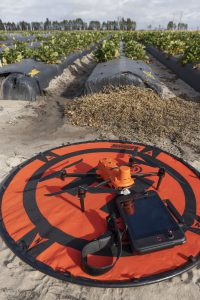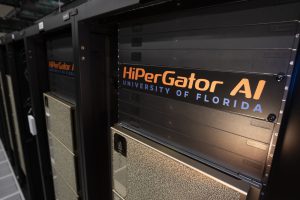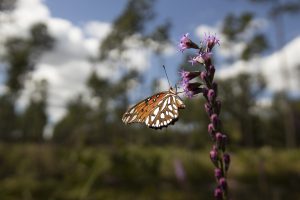All right, let’s talk about UF’s virtual genius elephant in the room: artificial intelligence (or “AI” for short). The University of Florida is currently taking leaps in the field of AI, and it is already impacting how we surf the internet, do business, and the way we look at plants and animals.
What is AI?
The technical definition is as follows:
“The theory and development of computer systems able to perform tasks that normally require human intelligence, such as visual perception, speech recognition, decision-making, and translation between languages.” – Oxford Languages
The definition of AI is quite broad – with due reason – and UF has examples of the many facets for which AI is currently being utilized. UF surgeons are using the “MySurgeryRisk” app on their phones, which uses AI to monitor the vitals of post-surgery patients in order to observe, predict, and prevent post-surgical complications in recovering patients. AI is also used for the massive influx of data that is produced by our tech driven society. UF researchers, alongside NVIDIA computer graphics company, have produced the HiPer Gator supercomputer, which is used to analyze masses of data and make sense of it. UF researchers are also using drones with multispectral imaging (high quality cameras) that can autonomously fly over tomato fields and detect forms of disease, a money saving technique that will help the 3rd largest crop produced in Florida.

UF has clearly made a large contribution to the AI world and is continuing to do so by investing in their new college of AI. AI will continue to change the way industry develops, but one might ask if it is affecting the way we live our day-to-day lives. There are some obvious answers such as GPS, your recommended Netflix shows, and your Facebook feed, which are all great answers, but let’s talk about how it ties into our urban environments.

Seeing Nature Through AI
When was the last time you found a weed in your yard and could not identify it? Don’t feel bad, that’s about 99% of the visits to our plant clinic. It’s hard to identify plants, and unless you have a plant physiology glossary, several plant ID books, and a large enough specimen with mature identifiable features, you’re likely not going to figure it out. There originally was no better way, but with the power of AI, we can identify plants using active learning and citizen science.
One of the best examples of AI identification is the iNaturalist App developed by the California Academy of Sciences and National Geographic. All it requires is for you to hold your phone camera up to the specimen and it will do its best to identify it all the way down to the species. If it can’t identify the exact species, it will still try to determine the kingdom, phylum, class, order, or genus. How is this possible? Citizen science is what propels the iNaturalist AI to improve. Essentially, the app works by citizens taking pictures to identify plants and animals, and (once correctly verified) those pictures are used to help people trying to identify the same plants. Over time, AI has continued to stockpile photos for each species, which improves its chances of correctly identifying a species. Essentially, the iNaturalist AI is actively learning with each new person who uses it.

Is AI changing our world? Yes, and it will continue to play a bigger and bigger role as our world continues technologically advancing. Is it difficult to understand or even scary? It can be. We are now working with AI tools that can come up with answers in one day that would take scientists years to solve. Just like every new technology, there is potential to do both good and harm, and UF has seen how AI can make a positive impact. If you would like to know more about the positive impacts of UF’s AI program, you can visit (https://ai.ufl.edu/).
 2
2
